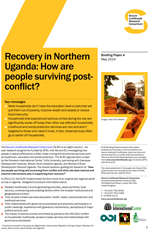In 2012/13, the Secure Livelihoods Research Consortium (SLRC) implemented the first round of an original sub-regional panel survey in northern Uganda aimed to produce data on livelihoods, access to and experience of basic services, exposure to shocks and coping strategies, people’s perceptions of governance, and the impact of serious crimes committed during the Government of Uganda and Lord’s Resistance Army conflict.
Main findings include:
- Most households don’t have the education level or economic opportunities that will pull them out of poverty, improve wealth and assets, or reduce food insecurity.
- Households that experienced serious crimes during the war are significantly worse off today than other war-affected households.
- Livelihood and social protection services are rare and aren’t targeted to those who need it most, in fact, these services often go to better-off households.







